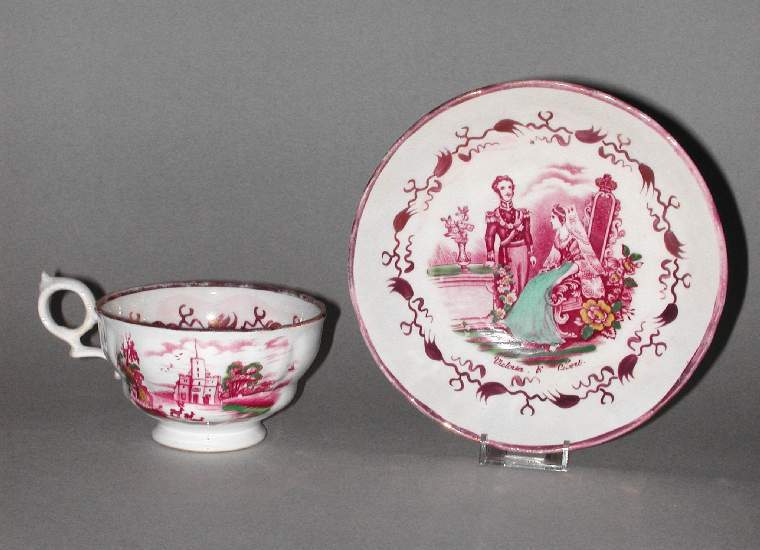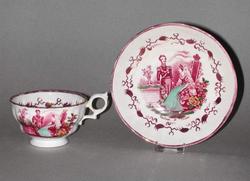Current Location: In storage
Titles
Victoria & Albert
Maker(s)
Production:
Unidentified factory
(Probably)
Entities
Categories
Description
Bone china cup and saucer decorated with transfer-printed and enamelled vignettes of Queen Victoria and Prince Albert, and borders of pink lustre
Bone china, transfer-printed in puce and painted with pink lustre and green and yellow enamels. Cup with wide bowl, raised and flared foot-rim and ring handle; saucer with deep bowl and wide foot-rim. On the saucer a transfer image surrounded by a copper-pink lustre wreath, the rim edged with lustre. On the cup, transfer images on either side (one the same as on saucer), a copper-pink lustre wreath band around the inside of the bowl and the rim edged with lustre. The underside of the cup recessed and glazed, with a pronounced foot-rim. The images and text are as follows:
(a) On the saucer and on one side of the cup: the Queen is seated, with the Prince standing to her right, her throne bears a crown. She wears a veil, and a dress with a turquoise-green skirt; he is in dress uniform.There are yellow and green wreaths either side of Victoria and a vase of flowers behind Albert. The image on the saucer has, at the bottom, ‘Victoria & Albert’.
(b On the other side of the cup: a castle and trees, with three deer in the foreground, the trees coloured with green and yellow.
Notes
History note: Bought at A. G. Harrison’s 20 King Street, London EC, on 20 June 1911 for 6s.0d. (six shillings) by Dr J.W.L. Glaisher, FRS, Trinity College, Cambridge
Legal notes
Dr. J.W.L. Glaisher Bequest
Measurements and weight
Diameter: 14.5 cm
Width: 11.5 cm
Acquisition and important dates
Method of acquisition: Bequeathed
(1928-12-07)
by
Glaisher, J. W. L., Dr
Dating
Victoria I
19th Century, Early
Circa
1840
CE
-
1845
CE
Note
English lustreware was commercially produced from c.1805 and popular throughout the first half of the 19th Century. Staffordshire potters were the first and largest producers, though similar wares were also made in other regions and pink lustreware is often particularly associated with Sunderland. Minute amounts of gold were used to produce copper, gold, pink or purple lustre, depending on the type of clay, lustre formula, number of layers and firing temperature; platinum was used to mimic silver. Lustreware was particularly popular for jugs, though dishes, goblets and tea wares are also found. It was mostly made for everyday use, and factory markings are rare.
Queen Victoria (1819-1901)and Prince Albertof Saxe-Coburg and Gotha (1819-1861) were betrothed in 1839, two years after she acceded to the throne, and married in February 1840. The image here is of a young couple, which suggests the cup and saucer were made early in the marriage, which lasted until Albert’s death in 1861. The Queen spent much of the year at Windsor Castle, perhaps depicted in the second transfer.
The vignette of Victoria and Albert was based on a stipple engraving by Samuel Bradshaw after Frank Topham, entitled 'Her most Gracious Majesty Queen Victoria and His Royal Highness Prince Albert Married Feby 10th 1840', a copy of which is in the National Portrait Gallery, no. D20923.
Transfer printing was introduced in the second half of the 18th century, generally using the glue bat method. The design was engraved on a copper plate, which was covered with linseed oil; a thin bat of animal glue was pressed onto the oiled plate and then applied to the ware. The ware was then dusted with powdered metallic oxide, which adhered to the oil, and fired to fix the design. Round-bodied vessels were particularly well suited to this method as the flexible bat could be stretched around curves.
People, subjects and objects depicted
Components of the work
Decoration
composed of
lustre
( pink (gold))
ceramic printing colour
( puce)
enamels
( turquoise-green, green, yellow)
clear glaze
Saucer
Height 3 cm
Cup
Height 5.7 cm
Materials used in production
Bone china
Inscription or legends present
- Text: Victoria . & Albert.
- Location: Below vignette on saucer
- Method of creation: Transfer-printed
- Type: Inscription
- Text: '887'
- Location: Underside of saucer
- Method of creation: Hand-painted in pink lustre
- Type: Mark
- Text: ‘J.W.L.GLAISHER COLLECTION’ and ‘108 / 28’.
- Location: Underside of cup and saucer
- Method of creation: Small round paper label, printed and inscribed in black ink
- Type: Label
- Text: ‘No 3413 cup and saucer commemorative of the marriage of Queen Victoria in 1840 b. in London June 20, 1911’
- Location: Underside of saucer
- Method of creation: Rectangular paper label handwritten in black ink
- Type: Label
- Text: ‘3413’
- Location: Underside of saucer
- Method of creation: Rectangular paper label, printed
- Type: Label
References and bibliographic entries
Identification numbers
Accession number: C.33 & A-1928
Primary reference Number: 74558
Old object number: C.108-1928
Glaisher number: 3413
Stable URI
Audit data
Created: Saturday 6 August 2011
Updated: Tuesday 30 April 2024
Last processed: Wednesday 14 May 2025
Associated departments & institutions
Owner or interested party:
The Fitzwilliam Museum
Associated department:
Applied Arts





